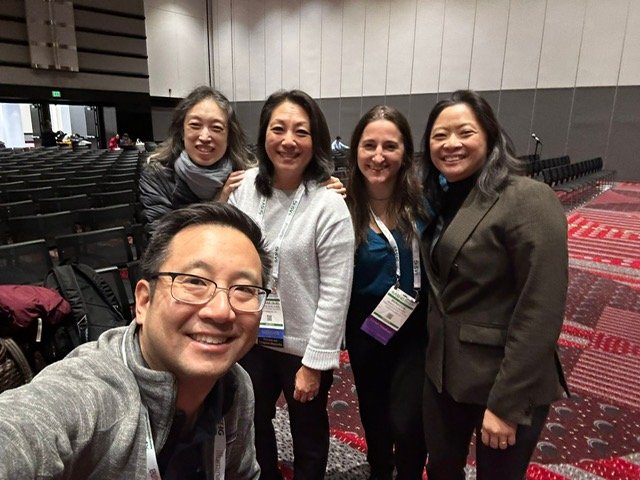I had the pleasure of attending the India Academy of Medical Genetics. It was wonderful to see the research being done on ARTHS by fellow scientists in India.
ASHG 2024
Had a great time presenting our work on ASXL1 at the American Society of Human Genetics in Denver!
ASXL Research Related Endowment 2024 Conference!
Had a wonderful time presenting at the ARRE Conference and learning about all the amazing research around the ASXL1/2/3 disorders!
Congrats Dr. Isabella Lin
Congratulations for successfully completing your PhD! She is back to medical school at the UCLA MSTP to get her second doctorate!
Recent graduates defended their thesis in the lab!
Congrats to Leroy Bondhus who successfully defended his thesis in May 2024!
ASHG2023--
The American Society of Human Genetics is one of my favorite meetings that I have been going to since I was a graduate student. This year, 3 of the members of the lab went to Washington DC to present their work!
Our new paper using 3D printing to optimize scale of NGS-based clinical testing
Congrats to the SwabSeq Team and Laila Sathe for putting together this important work!
Better late than never!
Celebrating the second PhD graduate from the Arboleda Lab in 2022: Dr. Sarah Spendlove! She defended her thesis in May 2022 and her thesis was focused on genetic architecture of rare disease. Congrats!
2022 Review
So many awards for the students in the lab last year! I’m certain 2023 will be even more fruitful for the growing lab!
New Preprints: Using multiomics to study the role of ASXL1 in Bohring Optiz Syndrome and AML
We just published two new preprints— the hard work of Isabella Lin, MSTP student in her PhD 3 year in the lab! These are a long term projects we have exploring the gene regulatory role of ASXL1 in patient-derived cells. here we identify how ASXL1 mutations change the epigenetic landscape and activate Wnt signaling pathtways in differentiated cells. Specifically we highlight both canonical signaling pathways and non-canoncial planar cell polarity pathways are affected by BOS. For the full preprint see here:
Truncating ASXL1 mutations in Bohring-Opitz Syndrome dysregulate canonical and non-canonical Wnt Signaling
We also explored whether the same observations in patient germline syndomes with ASXL1 mutations affect the same pathways in Acute myeloid leukemia with ASXL1 mutations.
ASXL1 mutations that cause Bohring Opitz Syndrome (BOS) or acute myeloid leukemia share epigenomic and transcriptomic signatures
Congrats to Maria Palafox for passing her oral thesis defense!
The first graduate student in the lab, Maria Palafox passed her oral defense on December 8, 2022! What a conderful day!
Congrats to Isabella Cardenas for her CARE Fellowship Program acceptance!
Isabella Cardenas, an undergraduate research volunteer, has been named a CARE Fellow for the 22-23’ academic year. The CARE Fellowship Program funds sophomores in research at UCLA and provides professional development on research writing and presentations. As a CARE fellow in the Arboleda Lab, Isabella will continue working with PhD student, Aileen Nava, on KAT6 loss-of-function and gain-of-function experiments in human stem cells."
ASHG 2022
Genetics and Genomics Graduate Student, Leroy Bondhus publishes his first Paper!
Leroy Bondhus, PhD student along with two UCLA undergraduate students: Yenifer Hernandez and Roshni Varma, published a paper in Briefings in Bioinformatics this week: Balancing the transcriptome: leveraging sample similarity to improve measures of gene specificity
The spatial and temporal domain of a gene's expression can range from ubiquitous to highly specific. Quantifying the degree to which this expression is unique to a specific tissue or developmental timepoint can provide insight into the etiology of genetic diseases. However, quantifying specificity remains challenging as measures of specificity are sensitive to similarity between samples in the sample set. For example, in the Gene-Tissue Expression project (GTEx), brain subregions are overrepresented at 13 of 54 (24%) unique tissues sampled. In this dataset, existing specificity measures have a decreased ability to identify genes specific to the brain relative to other organs. To solve this problem, we leverage sample similarity information to weight samples such that overrepresented tissues do not have an outsized effect on specificity estimates. We test this reweighting procedure on 4 measures of specificity, Z-score, Tau, Tsi and Gini, in the GTEx data and in single cell datasets for zebrafish and mouse. For all of these measures, incorporating sample similarity information to weight samples results in greater stability of sets of genes called as specific and decreases the overall variance in the change of specificity estimates as sample sets become more unbalanced. Furthermore, the genes with the largest improvement in their specificity estimate's stability are those with functions related to the overrepresented sample types. Our results demonstrate that incorporating similarity information improves specificity estimates' stability to the choice of the sample set used to define the transcriptome, providing more robust and reproducible measures of specificity for downstream analyses.
Congratulations to Sarah Spendlove on her First, First Author paper as a graduate Student!
link to PDF
Sarah’s paper explore the role of common genetic variation in the rare, pediatric phenotype of congenital heart disease. Her work shows that common genetic varients that influence more common traits like heart-valve disease can account for ~ 2 % of the genetic variance of these disorders. This work is among the first papers that look at the role of polygenic risk scores on the severity of congenital phenotypes! Congrats Sarah!
Presenting our work on Coccidiodiomycosis at the Annual Meeting!
Congrats to Sarah Spendlove on her first conference podium presentation at the Annual Coccididomycosis Meeting in Bakersfield, CA!












